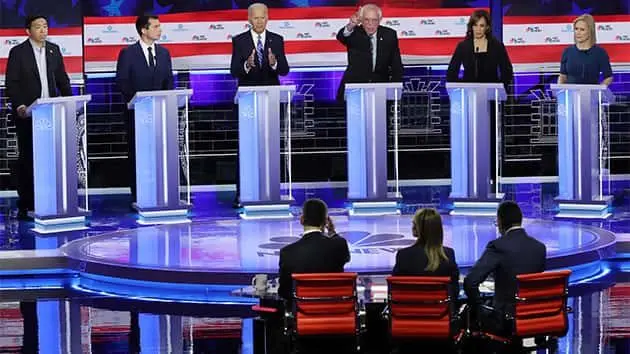
Detroit Debate Tips From a Behavioral Scientist
By Lilly Kofler
As we saw during the last round of Democratic debates, it’s hard to get a word in edgewise if everyone is demanding to talk. And it’s ludicrous to ask serious people to address pressing challenges with single-word answers and raised hands. In short, game-planning a 20-person, two-night debate is unlike anything political strategists have ever had to do.
That’s why the best debate coach in Detroit might not be a campaign consultant but a behavioral scientist. Translating these four basic concepts from behavioral science onto the debate stage suggests some opportunities for candidates to stand out in the crowd.
First, be nice. Remarkably, this is considered groundbreaking advice in politics, where candidates typically draw contrasts by attacking their opponents. That option isn’t available when the other options are either well-liked or unknown. It would be like pancakes going negative on oatmeal.
Instead, candidates should employ an aspect from behavioral science called “signaling.” This is common in sexual selection in which animals send signals, such as a plume of colorful tailfeathers, to indicate their availability. Humans use a variety of ways to send non-conscious cues to people in our social environment, such as donating blood to indicate generosity and good health.
Likewise, talking out of turn or over someone else might be an effective tactic to gain speaking time, but it sends an anti-social signal. Better to show an ability to collaborate by favorably referring to other candidates’ comments (“Senator So-and-so was right, which is why I propose…), looking at others when they’re talking to demonstrate respect, and sticking to 60-second time limits to show respect for rules.
In fact, the idea of endorsing a competitor’s ideas to make yourself look good is what behavioral economists call reference dependence, or the practice of setting a benchmark for comparison’s sake. Think of going out to bars with someone who resembles you but is less good-looking. People you encounter probably aren’t evaluating you against everyone in the world. More likely, they’re judging you against the nearby available choices.
Likewise, it’s hard for a voter to fairly evaluate 20 candidates, especially spread out over two nights. Candidates who are better able to, in effect, go bar-hopping for votes with another candidate might find more success, whether it’s Jay Inslee “yes, and-ing” Bill de Blasio or someone noticing that Beto O’Rourke is much better-looking than Gov. John Hickenlooper, whose podium will be next to his.
Next, communicating amid the din of nine other voices – not to mention the moderators’ – is nearly impossible for anyone, especially someone who is trying to seriously discuss the most complicated issues facing us. In such a situation, cognitive fluency, a term for how easy it is to process information, increases your success, such as when IPOs do better when the stock’s ticker symbol is easy to pronounce.
In fact, this is already happening. In the last round, moderators asked candidates to raise their hands if they agreed with complicated policy propositions and in other cases asked for one-word answers. Candidates used a three-word phrase to summarize a massive plan to virtually end the private healthcare industry (Medicare for All). These are imperfect but not ineffective methods of achieving cognitive fluency.
Finally, the mere-exposure effect, sometimes also called the familiarity principle, would suggest that voters will tend to choose candidates simply because they are familiar with them. Bernie Sanders achieved this in 2016 by repeating certain things so often (“millionaires and billionaires”) that he became fun to parody. Comedians have catch phrases. Ads have jingles. Senator Elizabeth Warren is now better-known for the familiar refrain about her policies (“She’s got a plan for that”) than any of her policies.
Don’t get me wrong; substantive policies are great. In fact, they should be the baseline expectation of anyone running for president. But to stand out in an environment meant to equalize everyone, a successful candidate will recognize that she or he isn’t just communicating with words or gestures but with non-verbal cues that humans have been using for longer than we’ve had language.
Lilly Kofler is U.S. Director of Behavioral Science at Hill+Knowlton Strategies in New York.




